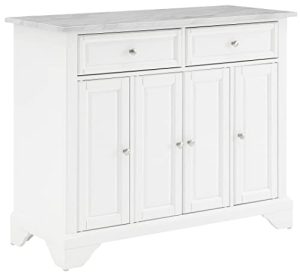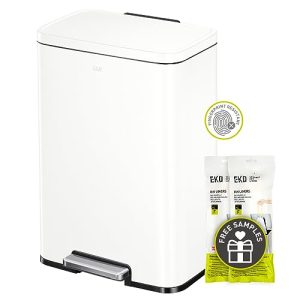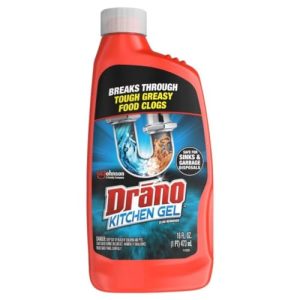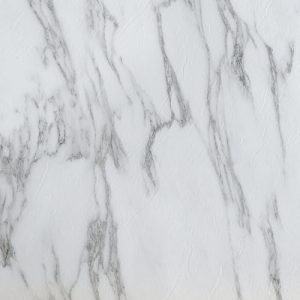Your kitchen grill is the secret weapon for delicious meals, but cleaning it can feel like a tough chore. Imagine biting into perfectly grilled food without worrying about leftover grease or burnt bits.
What if you could make your grill look and work like new with simple steps you can do today? You’ll discover easy and effective ways to clean your kitchen grill fast. Keep reading to unlock tips that save you time, effort, and frustration—so you can focus on enjoying great food.
Tools And Supplies Needed
Having the right tools and supplies makes cleaning your kitchen grill easier and more effective. Without them, you might spend more time scrubbing or struggle to get the grill truly spotless. Let’s look at what you need to get the job done well.
Essential Cleaning Tools
- Grill Brush:A sturdy brush with stiff bristles helps remove stuck-on food and grease. Choose one with a long handle to protect your hands from heat and grime.
- Scraper:A metal or plastic scraper is perfect for lifting off tough residues. It works best after the grill has cooled slightly but before hardened buildup sets in.
- Microfiber Cloths or Sponges:Soft cloths or non-abrasive sponges wipe down surfaces after scrubbing. They help catch loosened debris without scratching the grill.
- Bucket or Basin:Use it to soak grill parts or to hold warm, soapy water. This makes loosening grime easier and speeds up the cleaning process.
- Rubber Gloves:Protect your hands from harsh cleaners and hot water. Gloves also improve grip when handling slippery grill parts.
Recommended Cleaning Agents
Choosing the right cleaning agents ensures your grill gets clean without damage. Avoid harsh chemicals that can leave residues affecting food taste.
- Dish Soap:A mild dish soap mixed with warm water cuts through grease effectively. It’s safe for most grill surfaces and easy to rinse off.
- Baking Soda:This natural abrasive helps tackle burnt-on spots without scratching. Sprinkle it on the grill, add a little water to form a paste, then scrub gently.
- White Vinegar:Use vinegar as a natural degreaser and deodorizer. Spray it onto the grill, let it sit for a few minutes, then wipe clean.
- Commercial Grill Cleaners:If your grill has stubborn buildup, specialized cleaners can save time. Just check that they are food-safe and follow the instructions carefully.
Have you ever tried cleaning a grill with just soap and water, only to find grease still stuck? Adding baking soda or vinegar can change the game entirely. What combination of tools and cleaners works best for your grill?
Preparing The Grill
Preparing your kitchen grill before cleaning is essential for an effective and safe process. Taking the right steps early can save you time and effort later. It also helps protect your grill and yourself from damage or injury.
Safety Precautions
Before you start cleaning, make sure the grill is completely cool. Hot grills can cause serious burns, so patience is key here.
Disconnect the grill from any power source or gas supply. This prevents accidental ignition while you’re working on it.
Wear protective gloves to shield your hands from sharp edges and harsh cleaning chemicals. Have a mask handy if you’re using strong cleaners to avoid inhaling fumes.
Removing Loose Debris
Begin by brushing off loose food particles and ashes. Use a grill brush or scraper designed for your grill type.
Don’t rush this step. Removing as much loose debris as possible first makes the deep cleaning much easier.
Try flipping the grill upside down and tapping it gently to shake off stubborn bits. This simple trick often surprises people with how much debris falls away before any scrubbing.
Cleaning The Grill Grates
Grill grates need regular cleaning to remove food and grease. Use a stiff brush and warm soapy water for best results. Rinse well and dry before using again.
Cleaning the grill grates is a crucial step to ensuring your kitchen grill remains efficient and safe to use. Regular maintenance of the grates not only extends the life of your grill but also enhances the taste of your food by preventing unwanted flavors from previous meals. Let’s dive into some effective techniques to keep those grates spotless.Soaking Techniques
Soaking your grill grates is an effortless way to loosen up stubborn grease and grime. Fill a basin or your sink with warm water and add a generous amount of dish soap. Submerge the grates completely and let them soak for at least 30 minutes. For a more intensive clean, consider adding a bit of baking soda to the water. The mild abrasiveness helps break down grease without damaging the grates. After soaking, you’ll notice the grime is much easier to remove.Scrubbing Methods
Once soaked, it’s time to scrub away the loosened residue. Use a grill brush with sturdy bristles to tackle the grime. Move the brush back and forth along the grates to ensure you’re reaching all areas. For hard-to-reach spots or stubborn bits, an old toothbrush can be surprisingly effective. It allows for detailed cleaning between the bars. Always rinse the grates thoroughly after scrubbing to remove any soap or residue. What are some of your go-to tools for scrubbing those tricky spots on your grill? Share your thoughts and tips below!Cleaning Burners And Other Parts
Cleaning burners and other grill parts is essential to keep your kitchen grill working efficiently and safely. Neglecting these components can cause uneven heat distribution and even clog the gas flow. Regular maintenance helps you avoid costly repairs and keeps your food tasting great.
Removing And Cleaning Burners
Start by turning off the grill and disconnecting it from the gas supply for safety. Carefully remove the burners according to your grill’s manual—most slide or unscrew easily. Avoid using harsh tools that might damage the burner’s surface or gas ports.
Soak the burners in warm, soapy water for about 20 minutes to loosen grease and debris. Use a soft brush or a toothbrush to gently scrub the burner holes and surfaces. If some holes remain clogged, a thin wire or a toothpick works well to clear them without causing damage.
Dry the burners completely before reinstalling. Moisture left inside can cause rust or interfere with ignition. Have you noticed uneven flames or difficulty lighting your grill? Cleaning burners this way often solves those problems quickly.
Cleaning The Drip Tray And Exterior
The drip tray collects grease and food particles that can cause flare-ups or bad odors. Remove the tray and dispose of any grease safely to avoid spills. Wash the tray with hot, soapy water and scrub stubborn spots using a non-abrasive sponge.
For the grill’s exterior, wipe down the surfaces with a damp cloth and mild detergent. Avoid abrasive cleaners that can scratch the finish. Pay special attention to knobs and control panels where grease tends to build up.
Dry all parts thoroughly before reassembling to prevent rust or electrical issues. Keeping these areas clean not only improves your grill’s appearance but also extends its lifespan. When was the last time you gave your grill a thorough wipe-down?
Dealing With Stubborn Stains
Stubborn stains on your kitchen grill can turn a simple cleaning task into a frustrating challenge. These tough spots often come from burnt-on grease, charred food, or mineral deposits that resist quick scrubbing. Tackling them requires a bit more effort and the right approach to restore your grill’s shine without damaging its surface.
Using Natural Cleaners
Natural cleaners offer a gentle yet effective way to break down grime. Baking soda is a personal favorite because it acts like a mild abrasive without scratching the metal. Sprinkle some on the grill, add a little water to make a paste, and let it sit for 15–20 minutes.
Then, use a soft brush or sponge to scrub the stains away. Vinegar is another powerful natural cleaner; spraying it on the grill can help dissolve grease. Have you tried soaking your grill parts in a mixture of vinegar and water overnight? It often loosens even the toughest buildup.
Applying Commercial Cleaners
Commercial cleaners are designed specifically for heavy-duty kitchen grime. When you choose one, look for a product labeled safe for grills to avoid corrosion. Apply the cleaner according to the instructions, usually letting it sit for a few minutes to penetrate the stains.
Use a scrub brush or steel wool for stubborn spots, but be careful not to damage the grill’s surface. After scrubbing, rinse thoroughly with hot water to remove any chemical residue. Have you noticed how some commercial products make the cleaning process much faster? Just remember to wear gloves and work in a well-ventilated area.
Drying And Reassembling The Grill
After thoroughly cleaning your kitchen grill, proper drying and careful reassembly are key to keeping it in great shape. Moisture left on grill parts can cause rust and damage. Taking the right steps ensures your grill stays safe and ready for the next use.
Proper Drying Methods
Start by wiping each grill part with a dry cloth. Use a clean towel to remove water from hard-to-reach places.
Let the parts air dry completely. Place them on a drying rack or a clean surface. Avoid stacking parts while wet to prevent moisture buildup.
For faster drying, use a fan or open windows to increase air circulation. Never use heat sources like hair dryers, as they can warp plastic or damage coatings.
Reattaching Components
Check each part for dryness before reassembling. Begin with larger components like the grill plates or grates.
Align parts carefully according to the manufacturer’s instructions. Make sure each piece fits snugly to avoid damage.
Tighten screws and fasteners gently but firmly. Avoid overtightening, which can crack or strip parts.
Test the grill’s stability once fully assembled. Wipe the outer surface to remove fingerprints or dust.
Maintaining Your Grill
Maintaining your kitchen grill keeps it working well and safe for cooking. Regular care stops grease and food bits from building up. A clean grill also helps your food taste better. Simple habits make cleaning easier and extend the grill’s life.
Regular Cleaning Tips
Clean your grill after every use. Let it cool a little but still warm for easier scrubbing. Use a grill brush to remove stuck food and grease. Wipe down the grill grates with a damp cloth. Empty the drip tray often to avoid overflow. Wash the grill parts with warm, soapy water. Dry all parts before reassembling to stop rust.
Preventing Future Build-up
Apply a thin layer of cooking oil on the grill grates before cooking. This stops food from sticking. Cover your grill when not in use to protect it from dust. Avoid cooking very fatty foods often, as they create more grease. Check the grill regularly for any grease or dirt. Clean small spills right away to prevent hard stains. Store your grill in a dry place to avoid moisture damage.
Frequently Asked Questions
How Often Should I Clean My Kitchen Grill?
Clean your kitchen grill after every use to prevent grease buildup. Regular cleaning ensures better taste, hygiene, and prolongs grill life.
What’s The Best Way To Remove Grill Grease?
Use a grill brush with warm, soapy water to scrub grease. For stubborn spots, apply baking soda paste and rinse thoroughly.
Can I Use Natural Cleaners For Kitchen Grills?
Yes, natural cleaners like vinegar and baking soda effectively break down grease. They are safe, non-toxic, and environmentally friendly for grill cleaning.
How Do I Clean Grill Grates Without Damaging Them?
Avoid harsh chemicals or steel wool. Use a soft brush and mild detergent to protect the grate’s coating and maintain its durability.
Conclusion
Cleaning your kitchen grill keeps it safe and ready to use. Regular care stops grease buildup and smoke. Use simple tools like brushes and warm water. Clean grills cook food better and taste great. Remember, a clean grill lasts longer and looks nice.
Keep a routine, and grill cleaning won’t feel hard. Enjoy cooking with a fresh, shiny grill every time.

Sophie Hartwell is the founder of KitchenQuik.com, where she shares kitchen tips, smart cooking hacks, and the best product picks to make everyday cooking easier and more enjoyable.




